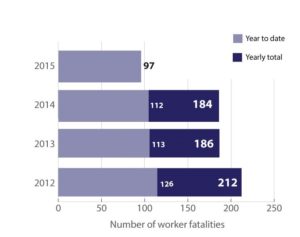Reasons why health and safety is so important
Why is health and safety in the workplace so important?
The main reason why health and safety is so important in the workplace is to keep people safe and healthy at work. No-one should be injured or have poor health affects as a result of work.
Unfortunately workplaces are often dangerous and people are sometimes injured or become ill in the course of their work. The number of fatalities alone are a sobering statistic. Safe Work Australia reports worker fatalities to August 2015 as 97 year to date which is lower than this time in previous years but still 97 too many. Everyone in the workplace needs to work together and follow health and safety requirements to make sure the workplace is as safe as possible and no-one is injured at work. Additionally governments have work health and safety laws are in place to make sure that health and safety is managed in the workplace.

Why do companies manage health and safety?
The primary reason why companies manage health and safety is to ensure the health and safety of their workers and everyone else associated with their business. In order to ensure companies do manage health and safety and to make sure companies know what they need to do to ensure a healthy and safe workplace, governments have health and safety laws in place that companies must comply with. There are additional reasons for companies to ensure a healthy and safe workplace. These include:
Financial reasons
Accidents and injuries are costly in terms of staff resources, time, financial outlays, equipment damage, disruption to operations and even public relation issues. Figures released by Safe Work Australia estimate the cost associated with work-related injury and illness to be more than $60 billion dollars per year.
Public relations
If the company is regarded locally as a poor performer in health and safety they may have a bad reputation in the community. This may impact on their ability to attract employees to work in the company especially considering the increasing competition for employees in regional locations where our companies are located.
Ethical and moral obligations
Responsible employers have an obligation to protect the health and safety of their employees and anyone else affected by their work activities.
Industrial relations
Poor health and safety may impact on the industrial relations at a site and subsequently affect the operation of the business.
Employee engagement and satisfaction
Involvement of employees in health and safety matters raises awareness and promotes conscious attention to personal safety and the safety of others.
What is the extent of workplace illness and injury in Australia?
Australian Workers Compensation Statistics, 2012 – 2013 provide an indication of the extent of workplace injury in Australia with approximately 118,000 serious workers compensation claims in 2012/13 and approximately 200 deaths each year.
‘Employees working as Labourers had the highest incidence rate of serious claims of all occupations in 2012–13p: 27.0 serious claims per 1000 employees, more than twice the national rate. Machinery operators & drivers made 24.4 serious claims per 1000 employees. Injuries and musculoskeletal disorders led to 90% of serious claims in 2012–13 and the most common type was Traumatic joint/ligament & muscle/tendon injury (45%)… Muscular stress while lifting or handling objects caused 33% of serious claims in 2012–13p, while Falls, trips & slips of a person caused 22% of serious claims… The median time lost from work for a serious claim …was 5.4 working weeks.’
For the injured person, a serious back injury, loss of hearing or loss of a limb are injuries that no amount of money can adequately compensate. Although workers receive some financial assistance after a work related injury through workers compensation payments, there are generally additional financial costs that may include loss of full wages, financial hardship, and a whole variety of personal, social and psychological costs They may affect ability to enjoy life, favourite pastimes, marriage and family life.
For companies, workplace injuries and accidents can result in higher workers compensation premiums, lost production, plant downtime, the costs of rehabilitating injured workers and/or the costs of training replacement workers and may lead to low plant morale.
For the community as a whole, workplace accidents place a huge burden upon our health system, lower the productivity of our economy and increase the burden on taxpayers. Clearly there are no winners.
